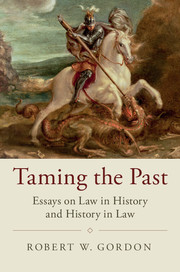Book contents
- Taming the Past
- Studies in Legal History
- Taming the Past
- Copyright page
- Dedication
- Contents
- Foreword
- Permissions
- Introduction
- Part I The Common Law Tradition in Legal Historiography
- 1 The Common Law Tradition in American Legal Historiography*
- 2 Holmes’s Common Law as Legal and Social Science*
- Part II Legal Historians
- Part III History and Historicism in Legal History and Argument
- Index
2 - Holmes’s Common Law as Legal and Social Science*
from Part I - The Common Law Tradition in Legal Historiography
Published online by Cambridge University Press: 13 July 2017
- Taming the Past
- Studies in Legal History
- Taming the Past
- Copyright page
- Dedication
- Contents
- Foreword
- Permissions
- Introduction
- Part I The Common Law Tradition in Legal Historiography
- 1 The Common Law Tradition in American Legal Historiography*
- 2 Holmes’s Common Law as Legal and Social Science*
- Part II Legal Historians
- Part III History and Historicism in Legal History and Argument
- Index
Summary
[This piece was published as part of a Symposium commemorating the 100th anniversary of O. W. Holmes, Jr., The Common Law in 10 Hofstra Law Review 719 (1982). Its attempt to place Holmes’s legal theory in its formative intellectual context has been followed by a massive and distinguished literature on Holmes. I think the best of this work is a fine intellectual biography by G. Edward White, Justice Oliver Wendell Holmes: Law and the Inner Self (1993); a thorough and probing examination of Holmes’s contributions to and views on legal history in David M. Rabban, Law’s History: American Legal Thought and the Transatlantic Turn to History (2013); Louis Menand’s illuminating exploration of Holmes’s pragmatist Cambridge circle in The Metaphysical Club: A Story of Ideas in America (2001); and especially Thomas Grey’s penetrating essay on “Holmes and Legal Pragmatism,” 42 Stanford Law Review 787 (1989). Grey’s essay has convinced me that I was wrong in the piece that follows to see the conceptualism of Holmes’s early essays in analytical jurisprudence as existing in unresolved contradiction with his later historicism. Grey persuasively argues that Holmes’s purpose in refining the logical arrangement of legal doctrine into conceptual categories was the modest pragmatic one of making current law more accessible and predictable to lawyers. But his historicism taught him that any such arrangements, including his own, must be transient and provisional, saturated as all law is with the contingent and irrational cultural beliefs and political struggles of its time and place.]
- Type
- Chapter
- Information
- Taming the PastEssays on Law in History and History in Law, pp. 50 - 74Publisher: Cambridge University PressPrint publication year: 2017

